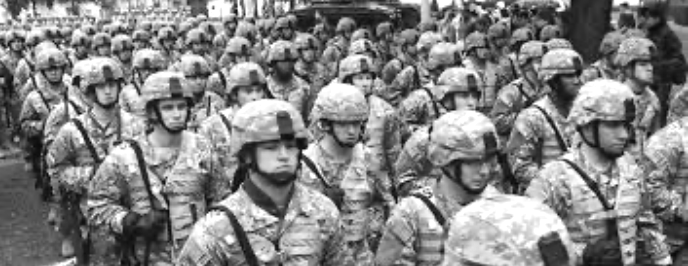Content:

Martial Law Explained
Brennan Center for Justice
06/09/2025
The limited Supreme Court precedent on martial law is old, vague, and inconsistent. No federal statute defines what the term actually means. As a result, the exact scope and limits of martial law are dangerously unclear. Congress and state legislatures must enact new laws that better define them.
What is martial law?
In the United States, martial law usually refers to a power that, in an emergency, allows the military to take the place of the civilian government and exercise jurisdiction over civilians in a particular area. But “martial law” has no established definition, because across history, different people have used the term to describe a wide variety of actions, practices, or roles for the military. The law governing it is complicated and unsettled — and, as a result, the concept has never been well understood.
Can the U.S. president declare martial law?
The Supreme Court has never clearly stated whether the federal government has the power to declare martial law, and if so, whether the president could unilaterally declare it or whether it would require congressional authorization. However, the Supreme Court’s 1952 ruling in Youngstown Sheet & Tube Company v. Sawyer provides a framework for analyzing exercises of executive power — and would likely be used by a court to determine whether a president’s martial law declaration has exceeded executive authority.
According to Youngstown, when Congress has addressed an issue by passing a statute, the president cannot act against Congress’s will — as expressed in the statute — unless the Constitution gives the president “conclusive and preclusive” power over that issue. When it comes to domestic deployment of the military, Congress has expressed its will in two ways.
First, it has enacted a wide variety of laws that regulate when and where the military may be used domestically. These laws are so comprehensive that Congress has “occupied the field,” meaning that if the president were to use the military domestically in a way that Congress has not affirmatively authorized (such as by declaring martial law), it would effectively be against Congress’s will.
Second, and more specifically, the Posse Comitatus Act makes it illegal for federal military forces to participate in civilian law enforcement activities — the exact sort of activities that are associated with martial law — unless Congress has provided express authorization.
In short, Congress has placed clear and wide-ranging restrictions on the president’s ability to use the military domestically. A presidential declaration of martial law would violate these rules. The Constitution does not grant the president “conclusive and preclusive” power over the issue of domestic military deployment. On the contrary, it gives most of the relevant authority to Congress. Therefore, under Youngstown, the president would not have the constitutional authority to override the restrictions Congress has put in place, and a unilateral declaration of martial law would not survive a legal challenge.
Does the Constitution apply under martial law?
Yes. The federal government is bound at all times by the Constitution. Even under martial law, the government cannot suspend or violate constitutional rights.
Additionally, martial law declarations are subject to judicial review. For example, if the federal government places a state or territory under martial law, individuals detained by the military can ask a federal court to order their release by petitioning for the writ of habeas corpus. Subsequently, if a court considers the petition, it can decide whether the declaration of martial law was constitutional in the first place.